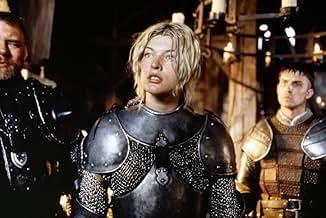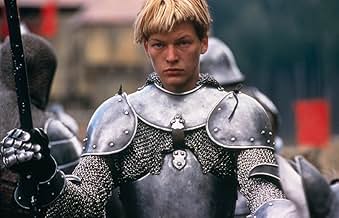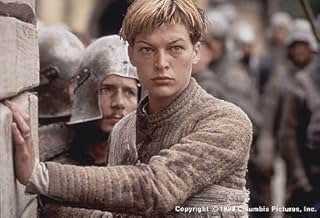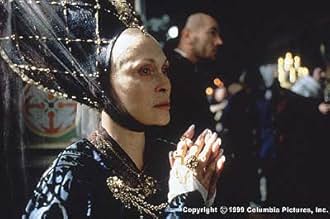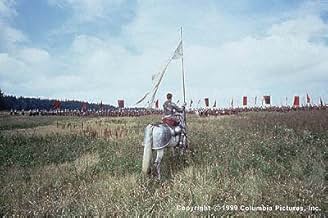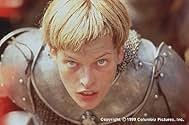IMDb RATING
6.4/10
72K
YOUR RATING
A young girl receives a vision that drives her to rid France of its oppressors.A young girl receives a vision that drives her to rid France of its oppressors.A young girl receives a vision that drives her to rid France of its oppressors.
- Awards
- 5 wins & 13 nominations total
Stéphane Algoud
- Look Out
- (as Stephane Algoud)
- Director
- Writers
- All cast & crew
- Production, box office & more at IMDbPro
Featured reviews
If you are wondering about Luc Besson's vaguely heretical "The Messenger: The Story of Joan of Arc", try to imagine a cross between "Excalibur" and "Heaven's Gate". It looks great but the basic story gets lost in the histrionics and excess.
There really was a very religious young girl who was considered a savior to France during The Hundred Years War. Although things may have eventually sorted themselves out the same way without her. Three years after her birth, the new tactics of the English archers were responsible for arguably the most one-sided battle in military history at Agincourt. The result was credited to Henry V's piety and he got a great passage in Shakespeare. The French aristocracy was almost wiped out by the battle and the English became solidly entrenched in France. Fourteen years later a new generation of French nobility was beginning to assert itself and it was the English and their French allies who were having leadership problems.
Both countries were Catholic at the time and both claimed that God was on their side, a bit like the football player who thanks God for the victory over another team that apparently God did not favor.
Although there are records of both of Joan's trials (her Condemnation Trial and her Rehabilitation Trial) both proceedings had their own political agenda and should be taken with a grain of salt. Besson's film seems to follow the generally accepted version of the story but takes obvious liberties with Joan's mental condition and visions. There is no way to prove or disprove any of this so it is probably as plausible as any other speculation.
What hurts "The Messenger: The Story of Joan of Arc" is that Besson's best scenes are at the very beginning and set too high a standard for the remainder of the film. Jane Valentine is wonderful as the young Joan and Besson shows that his directing skills with young actors was not confined to Natalie Portman's performance in "Leon". This early stuff features some of the most interesting scene juxtaposition that you are likely to see in any film. IMHO it gets off to a better start than any film in cinema history. And the sequence where the young Joan is standing on a hill watching as the English burn her village is as visually stunning as anything ever filmed.
But once Milla Jovovich's grown-up Joan takes over most viewers will find it difficult to stay focused on the story. It's not miscasting, Jovovich is noted for aggressive and daring performances (see "The Dummy") rather than subtlety and nuance, making her a good fit for the take Besson wanted on Joan's personality. The problem is that while a viewer could identify with the young Joan, the older Joan is just repellent. Her story should be inspirational and tragic. Instead it is a bunch of comic book battle scenes and comical melodrama.
But it is worth watching for the production design and the beginning sequences.
Then again, what do I know? I'm only a child.
There really was a very religious young girl who was considered a savior to France during The Hundred Years War. Although things may have eventually sorted themselves out the same way without her. Three years after her birth, the new tactics of the English archers were responsible for arguably the most one-sided battle in military history at Agincourt. The result was credited to Henry V's piety and he got a great passage in Shakespeare. The French aristocracy was almost wiped out by the battle and the English became solidly entrenched in France. Fourteen years later a new generation of French nobility was beginning to assert itself and it was the English and their French allies who were having leadership problems.
Both countries were Catholic at the time and both claimed that God was on their side, a bit like the football player who thanks God for the victory over another team that apparently God did not favor.
Although there are records of both of Joan's trials (her Condemnation Trial and her Rehabilitation Trial) both proceedings had their own political agenda and should be taken with a grain of salt. Besson's film seems to follow the generally accepted version of the story but takes obvious liberties with Joan's mental condition and visions. There is no way to prove or disprove any of this so it is probably as plausible as any other speculation.
What hurts "The Messenger: The Story of Joan of Arc" is that Besson's best scenes are at the very beginning and set too high a standard for the remainder of the film. Jane Valentine is wonderful as the young Joan and Besson shows that his directing skills with young actors was not confined to Natalie Portman's performance in "Leon". This early stuff features some of the most interesting scene juxtaposition that you are likely to see in any film. IMHO it gets off to a better start than any film in cinema history. And the sequence where the young Joan is standing on a hill watching as the English burn her village is as visually stunning as anything ever filmed.
But once Milla Jovovich's grown-up Joan takes over most viewers will find it difficult to stay focused on the story. It's not miscasting, Jovovich is noted for aggressive and daring performances (see "The Dummy") rather than subtlety and nuance, making her a good fit for the take Besson wanted on Joan's personality. The problem is that while a viewer could identify with the young Joan, the older Joan is just repellent. Her story should be inspirational and tragic. Instead it is a bunch of comic book battle scenes and comical melodrama.
But it is worth watching for the production design and the beginning sequences.
Then again, what do I know? I'm only a child.
The combination of Luc Besson and Mila Jojovich is a recipe for criticism. As in, "Oh sure the star is the directors wife". That would be true if Luc Besson was anything less than a great director or Mila Jojovich anything less than a great actress. This film accomplished a lot. Visually spectacular, historically challenging, and in many ways ingenious. Most of all, it didn't fall prey to the unconditional hero worship or unquestioning belief that most films about moving historical figures do. The film maintains it's historical modesty, questioning rather than preaching or glorifying. If you are looking for a moving, spiritual, emotional movie it's got all that. If you are looking for medieval warfare in all it's glory, it's got all that.
But sadly it is flawed. Much to my chagrin, as I do admire most of his work, Dustin Hoffman's performance is, to put it mildly, a big downer for the film. He is clearly at a loss as to what his character or purpose is in the film. His performance is uncomfortable and distracting. Despite his lower appearance in the credits, his role was critical in the film. It's a real detractor. But aside from this one glaring flaw, the film is of the highest quality on all accounts. I was riveted from beginning to end and wouldn't hesitate to watch it again. Because of it's one casting/directing flaw I have to rate it an 8 but on every other count it's a 10.
But sadly it is flawed. Much to my chagrin, as I do admire most of his work, Dustin Hoffman's performance is, to put it mildly, a big downer for the film. He is clearly at a loss as to what his character or purpose is in the film. His performance is uncomfortable and distracting. Despite his lower appearance in the credits, his role was critical in the film. It's a real detractor. But aside from this one glaring flaw, the film is of the highest quality on all accounts. I was riveted from beginning to end and wouldn't hesitate to watch it again. Because of it's one casting/directing flaw I have to rate it an 8 but on every other count it's a 10.
Luc Besson directs and Milla Jovovich stars as the Maid Of Orleans who lifted France of its knees-and was tried and executed for being a heretic. The End.
Well that's what you would think all Besson's film amounts too, given the hate and general negativity that pours down on it from many of the worlds cinematic sources. Well, look, it's not brilliant, but is it really the devil that many have painted it as? Not so say I. It's about as subtle as a sledgehammer all told, but Besson's study of the iconic/infamous waif who did indeed expel the British hoards has gusto by the shed load. He nicely crafts the 15th century lands from which to tell his story, and then, to quote someone from another period epic, unleashes hell. Literally. Yep the British armies are stereotypically vile {I bet Mel Gibson loves the Brit portrayals here}, and the blood that is shed is vicious and borderline sick. But it works well in the context of Jeanne's prominent rise and subsequent fall, with her religious confliction deftly blending in with the blood being shed in the pursuit of liberation. Visually the film is a treat, and for action construction it holds up to be one of the better modern day historical epics in that department. But where's the substance?
Ah, there's the big problem with the movie. Besson and his co-writer Andrew Birkin are so pre-occupied with the horrors of war and Jeanne's leadership qualities, they turn the rest of the film into a skeleton in need of flesh. And it's actually Jovovich who suffers the most. She's great when she's screaming and launching into the enemy, taking an arrow hit with grace and dedication . But there's been no character depth laid out, so Jovovich's Jeanne just comes across as a moody teenager out to cause trouble. We need to have some insight into her troubled predicament and what drives her on, not the scantily written filler moments that actually are just appetisers to blood letting battles. There 's also annoyances when the film slips into moments of modern day speak, it's a crass and lazy oversight by the makers to think that we wouldn't notice such speak in 15th Century France. Besson surrounds Jovovich with some fine acting talent tho, even if some are a tad underused. Rolling out are John Malkovich, Dustin Hoffman, Faye Dunaway, Vincent Cassel, Timothy West, Desmond Harrington and the always watchable, and scary, Tcheky Karyo.
So a bit hollow it be, but on the outside it's a ripper. Visceral, explosive and yes, fun too. 7/10
Well that's what you would think all Besson's film amounts too, given the hate and general negativity that pours down on it from many of the worlds cinematic sources. Well, look, it's not brilliant, but is it really the devil that many have painted it as? Not so say I. It's about as subtle as a sledgehammer all told, but Besson's study of the iconic/infamous waif who did indeed expel the British hoards has gusto by the shed load. He nicely crafts the 15th century lands from which to tell his story, and then, to quote someone from another period epic, unleashes hell. Literally. Yep the British armies are stereotypically vile {I bet Mel Gibson loves the Brit portrayals here}, and the blood that is shed is vicious and borderline sick. But it works well in the context of Jeanne's prominent rise and subsequent fall, with her religious confliction deftly blending in with the blood being shed in the pursuit of liberation. Visually the film is a treat, and for action construction it holds up to be one of the better modern day historical epics in that department. But where's the substance?
Ah, there's the big problem with the movie. Besson and his co-writer Andrew Birkin are so pre-occupied with the horrors of war and Jeanne's leadership qualities, they turn the rest of the film into a skeleton in need of flesh. And it's actually Jovovich who suffers the most. She's great when she's screaming and launching into the enemy, taking an arrow hit with grace and dedication . But there's been no character depth laid out, so Jovovich's Jeanne just comes across as a moody teenager out to cause trouble. We need to have some insight into her troubled predicament and what drives her on, not the scantily written filler moments that actually are just appetisers to blood letting battles. There 's also annoyances when the film slips into moments of modern day speak, it's a crass and lazy oversight by the makers to think that we wouldn't notice such speak in 15th Century France. Besson surrounds Jovovich with some fine acting talent tho, even if some are a tad underused. Rolling out are John Malkovich, Dustin Hoffman, Faye Dunaway, Vincent Cassel, Timothy West, Desmond Harrington and the always watchable, and scary, Tcheky Karyo.
So a bit hollow it be, but on the outside it's a ripper. Visceral, explosive and yes, fun too. 7/10
Some movies would probably try to make a more divine spirit out of Joan but at least Besson examines all possibilities as regards to what inspired her. I think it was as honest a film you could make about Joan. Her quest for revenge combined with tremendous belief in the forces above that ignited her fire. Through Dustin Hoffman the viewer can question her motives and get her response. And what a performance! Milla was simply breathtaking as Joan.
...but it still made interesting viewing. More biographies of Jeanne d'Arc exist than of any other person, and any attempt to portray her rather incredible life as France's greatest heroine and martyr on film can expect to encounter a similarly large number of second-guessers. This is precisely what happened when this picture came out. Reviewers went on at length about what the picture should have been about, and how Joan should have been portrayed (and by whom), leaving readers to wonder what they thought of the picture that HAD been made. This tendency to review the picture they wish had been made is a classic failing in many critics and this picture seemed to bring it out especially often.
The picture that Luc Besson made here deserves to be appreciated on its own merits. It is visually stunning, rousingly action-packed, and full of interesting period details. Yes, casting his supermodel wife Milla Jovovich in the lead was a risky choice, as her looks were hardly those of a typical medieval peasant. Yes, her performance did not resonate with the period the way one by a more classically trained actress might, although she was clearly never trying to be Ingrid Bergman. Still, Milla's hyperactive personality made her interesting and watchable as a historical person about whom so much has been written, who nonetheless existed so far back in the past that she lacks a strongly identifiable humanity. When somebody makes a better statue than a person, as Joan does from a contemporary viewpoint, odd casting choices can be forgiven if they work. Milla's twisty mannerisms, rolling eyes and whispery speech give the viewer constant occasions to ponder just how much of Joan's fanaticism came from genuine devotion to God and the church and how much was just an under-medicated personality disorder. This is actually one of the key scholarly issues surrounding Joan's life, and the picture brings it to the fore in its latter part as Joan herself tries to come to terms with her own claims of divine communication by means of a debate with Dustin Hoffman as her confessor-priest/conscience. That Besson takes no particular viewpoint here is an interesting choice, and one which actually helps the viewer to understand why Joan's story has compelled so many generations of historians.
The political aspects of Joan's life and legend were also dealt with in a nicely balanced fashion. Like many figures in times when political and national alliances changed with the seasons, Joan herself blew back and forth between being tremendously useful to the French throne at times and dangerously inconvenient at others. Fame is a powerful commodity at any time, and the picture carefully tracked the rise and fall of Joan's fortunes as she watched hers be manipulated, leveraged and ultimately put on trial.
I thought a lot of The Messenger and recommend it. Religious and historical scholars are advised to approach with caution.
The picture that Luc Besson made here deserves to be appreciated on its own merits. It is visually stunning, rousingly action-packed, and full of interesting period details. Yes, casting his supermodel wife Milla Jovovich in the lead was a risky choice, as her looks were hardly those of a typical medieval peasant. Yes, her performance did not resonate with the period the way one by a more classically trained actress might, although she was clearly never trying to be Ingrid Bergman. Still, Milla's hyperactive personality made her interesting and watchable as a historical person about whom so much has been written, who nonetheless existed so far back in the past that she lacks a strongly identifiable humanity. When somebody makes a better statue than a person, as Joan does from a contemporary viewpoint, odd casting choices can be forgiven if they work. Milla's twisty mannerisms, rolling eyes and whispery speech give the viewer constant occasions to ponder just how much of Joan's fanaticism came from genuine devotion to God and the church and how much was just an under-medicated personality disorder. This is actually one of the key scholarly issues surrounding Joan's life, and the picture brings it to the fore in its latter part as Joan herself tries to come to terms with her own claims of divine communication by means of a debate with Dustin Hoffman as her confessor-priest/conscience. That Besson takes no particular viewpoint here is an interesting choice, and one which actually helps the viewer to understand why Joan's story has compelled so many generations of historians.
The political aspects of Joan's life and legend were also dealt with in a nicely balanced fashion. Like many figures in times when political and national alliances changed with the seasons, Joan herself blew back and forth between being tremendously useful to the French throne at times and dangerously inconvenient at others. Fame is a powerful commodity at any time, and the picture carefully tracked the rise and fall of Joan's fortunes as she watched hers be manipulated, leveraged and ultimately put on trial.
I thought a lot of The Messenger and recommend it. Religious and historical scholars are advised to approach with caution.
Did you know
- TriviaMost of the characters, including Joan's Captains, were real people. Giles de Rais was a real person who, after the war and Joan's death, retired to his lands. Many years later, he was arrested for the murder of more than 100 young boys, and executed. Some historians believe that his crimes were the basis for the French fairy tale "Bluebeard," about a rich man who murders his wives and hides their bodies in his grand house.
- GoofsJoan's older sister was not murdered by soldiers, but survived to adulthood and married. She died ultimately in childbirth.
- Quotes
[In questioning Joan regarding all the gifts that King Charles VII bestowed upon her]
Priest: What about all these dresses you were given? Silk dresses, weren't they?
Joan of Arc: Yes, I was given a few, but I never had time to wear them.
Priest: Still... pretty wealthy for a peasant girl, wouldn't you say?
Joan of Arc: You look pretty wealthy to be a servant of God, wouldn't you say?
- Alternate versionsThe European release was 10 minutes longer than the US theatrical version, which omits, among others, the scene where Joan's virginity is tested before the court of King Charles VII. The longer version has been released in the USA on DVD.
- SoundtracksMy Heart Calling
Lyrics and Music by Éric Serra and Achinoam Nini
Produced by Éric Serra
Performed by Achinoam Nini
With the Special Authorization of Interscope/Geffen
- How long is The Messenger: The Story of Joan of Arc?Powered by Alexa
Details
- Release date
- Countries of origin
- Languages
- Also known as
- Juana de Arco
- Filming locations
- Bruntal, Czech Republic(Fort of the Tourelles)
- Production companies
- See more company credits at IMDbPro
Box office
- Budget
- $85,000,000 (estimated)
- Gross US & Canada
- $14,276,317
- Opening weekend US & Canada
- $6,360,968
- Nov 14, 1999
- Gross worldwide
- $66,976,317
- Runtime
- 2h 38m(158 min)
- Color
- Sound mix
- Aspect ratio
- 2.39 : 1
Contribute to this page
Suggest an edit or add missing content



